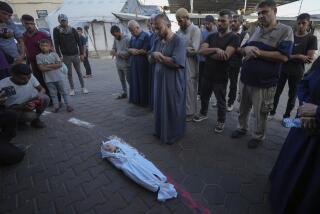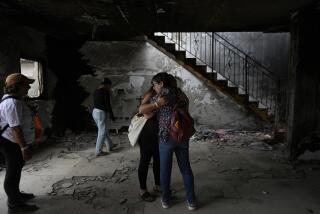Hamas leaders remain in hiding
GAZA CITY — On the first Friday since Israel ended its 22-day offensive in the Gaza Strip, some Palestinians gathered for weekly mass devotions by spreading prayer rugs on the streets outside the wreckage of mosques devastated by missile strikes.
Among those not making a public appearance, however, was the top local political leader of Hamas, Ismail Haniyeh. Rumors had been rife that Haniyeh, an Islamic religious scholar, would emerge from weeks of hiding to deliver a sermon.
But Haniyeh and former Palestinian Authority Foreign Minister Mahmoud Zahar remained underground, following the advice of their security details, officials said. Despite the unilateral cease-fire declared by Israel that took effect Sunday, the militant group is still wary of assassination strikes, said an official who spoke on condition of anonymity.
“We don’t trust the Israelis; there are no guarantees. The war is not over yet,” the official said.
As thousands participated in noon prayers, international organizations continued emergency relief efforts for the seaside enclave.
John Holmes, humanitarian affairs chief for the United Nations, told reporters that Israel was allowing 120 truckloads of food and medical supplies a day to enter Gaza. Holmes praised the “spirit of goodwill” shown by the Israeli government, saying the level of cooperation was far greater than in the weeks before the offensive began with airstrikes on Dec. 27.
The three-week operation, aimed at ending years of rocket fire into southern Israel from Hamas and other Palestinian groups, resulted in the deaths of 1,285 Palestinians, more than two-thirds of them civilians, according to the Palestinian Center for Human Rights. Infrastructure damages and economic losses total nearly $2 billion, according to the Palestinian Central Bureau of Statistics.
Thirteen Israelis were killed: three civilians from Gazan rocket strikes and 10 soldiers, several of them from “friendly fire.”
Israeli officials continue to hail the Gaza operation as a success, saying they had heavily damaged Hamas’ ability to fire rockets and delivered a painful lesson on the price of continued attacks. Among the buildings demolished were mosques where Hamas fighters and leaders were hiding or launching rockets, Israeli officials have said.
“Today Israel’s deterrence is higher than ever before,” outgoing Prime Minister Ehud Olmert said in an interview published Friday in the Israeli newspaper Maariv. Although Olmert expressed satisfaction with the planning and execution of the offensive, he said he was deeply affected by images broadcast on Israeli television of Palestinian doctor Izz el-Deen Aboul Aish, who lost three daughters in an Israeli shelling.
“I cried when I saw this. Who didn’t? How could you not?” Olmert said. “When you see a father whose three daughters were killed, you feel you’re about to explode that moment.”
Meanwhile, as Gazans begin to focus on rebuilding, a dispute continues to brew over where and to whom the reconstruction funds will flow.
Hamas, which routed the rival Fatah faction and took full control of Gaza in mid-2007, insists that it be the conduit for all reconstruction money. But Fatah, which rules the West Bank and controls the Palestinian Authority, has insisted that it manage the funds. Western-friendly Arab states such as Saudi Arabia, which has pledged $1 billion, are likely to favor Fatah in the dispute.
One of the few countries willing to directly fund Hamas is Iran, which has emerged in recent years as one of the militant movement’s main patrons. But it is unclear whether Israel would ever allow Iran to ship aid to its Gaza allies who also call for the destruction of the Jewish state.
Iranian Vice President Ali Saeedlu said Friday that his government planned to rebuild 1,000 homes, 500 businesses, 10 schools, five mosques, a hospital and a university, according to an article posted on the website of Press TV, Tehran’s state-owned English-language news channel.
A government reconstruction committee recently formed in Iran said it would provide medical care for 4,000 injured Gazans and aid for 1,000 orphans and help rebuild public infrastructure, Iranian news media reported.
Saeedlu oversaw the first meeting of the so-called Gaza Reconstruction Headquarters on Thursday, Iran’s Tabnak news website reported.
Though Iran has been circumspect in talking about plans to help replenish Hamas’ supply of rockets, Foreign Minister Manouchehr Mottaki said the militant movement had a legitimate right to rearm itself.
“For a nation that wants to fight, a nation that wants to defend itself, it is very natural to obtain the tools of resistance and to get anything it can have access to, from anywhere possible,” Mottaki was quoted as saying this week by state radio.
Israel and the United States continue to pressure Egypt to crack down on the hundreds of cross-border tunnels used for smuggling goods and weapons into Gaza.
On Friday, French President Nicolas Sarkozy said that his country would immediately deploy a warship off the Gazan coast to prevent weapons smuggling.
--
Special correspondent Ramin Mostaghim in Tehran contributed to this report.
More to Read
Sign up for Essential California
The most important California stories and recommendations in your inbox every morning.
You may occasionally receive promotional content from the Los Angeles Times.










